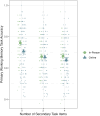The Effects of Mind-Wandering, Cognitive Load, and Task Engagement on Working Memory Performance in Remote Online Experiments
- PMID: 38288914
- PMCID: PMC10915650
- DOI: 10.1027/1618-3169/a000599
The Effects of Mind-Wandering, Cognitive Load, and Task Engagement on Working Memory Performance in Remote Online Experiments
Abstract
Recent changes in environments from in-person to remote present several issues for work, education, and research, particularly related to cognitive performance. Increased distraction in remote environments may lead to increases in mind-wandering and disengagement with tasks at hand, whether virtual meetings, online lectures, or psychological experiments. The present study investigated mind-wandering and multitasking effects during working memory tasks in remote and in-person environments. In two experiments, participants completed a working memory task with varied cognitive load during a secondary task. After each working memory trial, participants reported their mind-wandering during that trial. Some participants completed the procedures in-person, while others completed the procedures remotely. Overall, remote participants reported significantly more mind-wandering and poorer secondary task performance than in-person participants, but this pattern was not reflected in working memory accuracy. Both groups exhibited similar multitasking effects on performance. Additional analyses found that for remote participants, task engagement better predicted working memory performance than either cognitive load or mind-wandering rates but did not indicate a tradeoff in resources between tasks. Together, these results demonstrate the importance of considering multiple metrics when assessing performance and illustrate that making assumptions about the equivalence of remote and in-person work is a risky proposition.
Keywords: complex span; mind-wandering; multitasking; short-term memory; working memory.
Figures







References
-
- Baddeley, A., & Hitch, G. (1974). Working memory. In Bower G. H. (Ed.), Psychology of learning and motivation (Vol. 8, pp. 47–89). Elsevier.
LinkOut - more resources
Full Text Sources

